Allergy to dentures
During the period of adaptation to dentures and crowns, you need to carefully monitor yourself to understand how you get used to a foreign object. Very often the body develops an allergy to the prosthesis. This is an extremely unpleasant and even dangerous moment that needs to be tracked in time.
The reason lies in the materials. Plastic, some types of metal and dyes provoke a rash, swelling and redness of the mucous membrane. What to do in such cases? We'll figure out.
Hypoallergenicity is one of the main requirements for removable structures, crowns, pins, core inlays. Dentures must be durable, resistant to external factors (not change color when exposed to saliva and food), and not lose their aesthetic appearance. Of course, this is provided that they are manufactured in compliance with the rules, and their owners use them carefully and carefully monitor the hygiene of the oral cavity and the devices themselves.
Let us immediately note that there is no such rating of allergenic devices, because the reaction to the design components is individual for everyone. But the collected statistics show that there are still “leaders” who more often caused allergies in patients. These are structures containing the following components:
It also happens that the patient has no reaction to one component, but when mixed with others it becomes allergenic. Often metals such as nickel, manganese, chromium, cobalt and copper come under suspicion.
In addition to incompatibility with materials, there are other factors that cause a reaction to the device. An allergy to plastic crowns and dentures may not occur immediately, although this is what most often happens. Sometimes the patient complains of a rash, swelling or other symptoms after wearing it for a long time. What happened?
- Wear of the structure sometimes manifests itself with the symptoms described;
- increased acidity of saliva;
- a change in heat exchange between the prosthesis and the gum, due to which the tissues become more receptive and the monomer penetrates into the blood more easily;
- mucosal injuries.
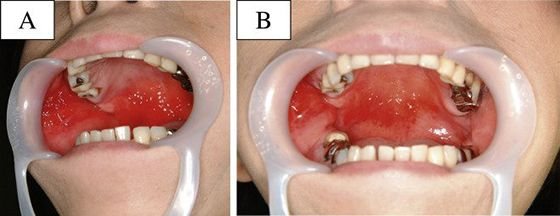
Rash, itching and swelling are the most common manifestations of allergies. What other signs are there that you should immediately pay attention to?
- Severe redness at the junction may also appear on the tongue, lip or cheek;
- pain—inexplicable, at first glance, severe discomfort in the mouth;
- burning, dryness, soreness, feeling as if something is constantly in the way;
- labored breathing;
- rhinitis;
- gastritis;
- temperature rise, both local and general.
The main task is to remove the source as soon as possible. If we are talking about a removable device, then everything is simple. And if there is a problem with implants or dental crowns, then you cannot do without an early visit to the dentist.
As soon as you notice that you are allergic to metal-ceramic crowns or other prosthetic structures, take an antihistamine (Claritin, Zodak, Fenistil, Tavegil, Loratadine). If the reaction is severe, it is worth injecting the drug Suprastin. You can call an ambulance; allergies are no joke.
Activated carbon, Enterosgel, Smecta and other sorbents will help quickly remove the allergen from the body.
The mouth can be rinsed with antiseptic solutions. After this, apply healing ointments and gels (Cholisal, Metrogyl denta) to the affected areas.
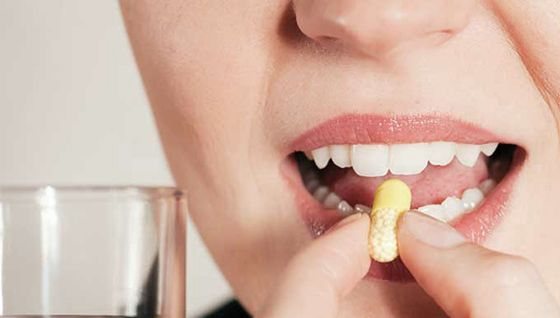
The situation is under control, and now it’s worth seeking advice from specialists. Who should I visit besides the dentist? An allergist, immunologist, endocrinologist and dermatologist will help to identify the culprit and cope with the problem.
For diagnosis, doctors may offer an exposure and elimination test (return the prosthesis and observe the reaction), patch tests (the allergen is applied to the skin), or a blood test.
The dentist may suggest remaking the device without “suspicious” materials or shielding the device, this is when a special metallized anti-allergenic coating is applied.
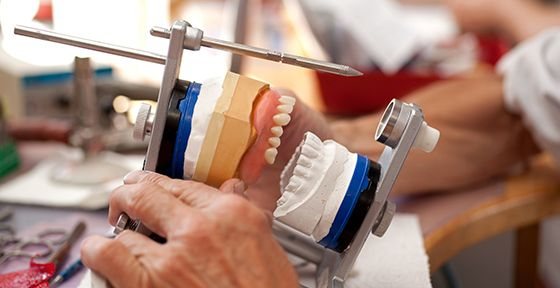
You need to choose a device taking into account the characteristics of the body, and do not strive for cheapness. A good hypoallergenic design is less of a hassle than one made from inferior materials.
A qualified orthopedist will strive to tailor the design to the patient as accurately as possible, take into account all the subtleties and features, and offer only biocompatible materials for the manufacture of the device.
But you can also prevent an allergic reaction or at least mitigate its manifestation by following simple rules. What do we have to do?
- Maintain oral hygiene, use an irrigator, rinses, and suitable toothpaste;
- avoid too solid foods in the diet;
- Clean the device well, use special products for this.
There is always a risk of an allergic reaction, but you can’t refuse a prosthesis completely either. Approach the issue with common sense, arm yourself with information, and then getting used to the design will be much easier.
What to do about allergies at home?
The main task is to remove the source as soon as possible. If we are talking about a removable device, then everything is simple. And if there is a problem with implants or dental crowns, then you cannot do without an early visit to the dentist.
As soon as you notice that you are allergic to metal-ceramic crowns or other prosthetic structures, take an antihistamine (Claritin, Zodak, Fenistil, Tavegil, Loratadine). If the reaction is severe, it is worth injecting the drug Suprastin. You can call an ambulance; allergies are no joke.
Activated carbon, Enterosgel, Smecta and other sorbents will help quickly remove the allergen from the body.
The mouth can be rinsed with antiseptic solutions. After this, apply healing ointments and gels (Cholisal, Metrogyl denta) to the affected areas.
Allergy to dentures: what to do and how to treat
Dentistry has many types of dental prosthetics. This is one of the effective and easy ways to restore the aesthetic appearance and functionality of the oral cavity.
Prosthetics has fewer contraindications than other types of restoration of lost teeth. The human body tolerates interaction with various materials well, but some materials in dentures can cause allergic reactions.
An allergic reaction is the sensitivity of the human body to a certain type of material that is used for dental prosthetics.
It is manifested by a deterioration in general health, inflammatory processes and other unpleasant symptoms. The immune system thus tries to get rid of an unwanted element that interacts with the body.
Most often, allergic reactions occur to removable dentures.
The reaction occurs to certain types of metals that make up the prosthesis:
Allergic reactions can occur not only to a specific type of metal, but also to a combination of several metals in one product.
In this case, when replacing one combination of materials with another, the reaction may disappear.
- Acrylic;
- Zirconium;
- Plastic;
- Metal-plastic;
- Nylon;
- Ceramic;
- Clasp dentures.
Studying the effect of prosthetic materials on the human body helps to identify and eliminate combinations of materials that most often cause allergies.
An allergic reaction due to individual intolerance to the materials that make up the prosthesis is accompanied by a certain set of symptoms that can appear at any time after installation.
Color change. The area next to the prosthesis takes on a rich red color. Any surface that comes into contact with foreign bodies can change color (cheeks, tongue, mucous membranes, gums, etc.). The reaction may appear on the lips or tongue.
Discomfort in the oral cavity. There may be soreness, severe dryness, discomfort, bitterness on the tongue, a feeling of the constant presence of a foreign body (does not go away for a minute), pain in any part of the oral cavity (tongue, jaw, teeth, lips, etc.).
Problems with the respiratory tract (exacerbation of asthma and other chronic diseases of the nasopharynx or oropharynx).
Rash. After installation of a prosthesis, rashes, redness, hives and other manifestations of an allergic reaction may appear on any part of the body.
Edema. Swelling of the tongue, gums, cheeks and other parts of the oral cavity may appear on the lips, near the place where the prosthesis is installed.
Temperature. Body temperature may increase significantly. If the allergy is severe, the temperature may rise above subfebrile (more than 38 degrees).
Quincke's edema (severe swelling of the larynx).
Anaphylactic shock. Occurs during a severe allergic reaction. It causes instant itching, difficulty breathing and a severe drop in blood pressure.
Causes of allergies
Most often, intolerance is caused by components in the prosthesis. The body may begin to perceive them as aggressive foreign compounds and triggers defense mechanisms. There is an increased production of globular protein - immunoglobulin E, as well as the hormone histamine, which prevent the spread of the allergen. At the same time, due to the expansion of capillaries, swelling, redness, itching and other negative signs develop.
Metals that most often cause allergies:
- cobalt (reaction occurs in 70% of allergic patients);
- chromium – 24%;
- nickel – 14%.
Metal-ceramic crowns are very popular. This is a good compromise between cost, strength and aesthetics in prosthetics. The basis is a metal frame, and on top it is lined with ceramic mass. Such prostheses occupy an intermediate position between conventional metal structures (now practically not used due to their unattractive appearance) and expensive crowns made of metal-free ceramics.
An allergy to metal ceramics is possible if the frame is cast from inexpensive alloys (for example, nickel-chromium or cobalt-chromium). There is a situation when a person has no reaction to one component, but when combined with another it becomes allergenic. Chemical elements can provoke not only an allergic reaction, but also toxic poisoning. Galvanic syndrome cannot be ruled out: due to the fact that there are various metals in the mouth, a galvanic current appears, intoxication of the body begins, salivation increases, and sleep is disturbed.
There is no reaction to metal-ceramic crowns with a frame made of gold and silver. For greater strength, other precious metals with hypoallergenic properties can be added: palladium to silver, platinum, palladium to gold. Such designs are good for everyone, except for the high price. It happens that copper is added to gold to make it cheaper.
You need to be careful here - copper often causes intolerance
Metal-free ceramics based on zirconium dioxide and aluminum oxide are also considered hypoallergenic. It is durable and has high aesthetic qualities, but the cost is also quite high. Titanium structures do not cause allergies, but due to the low level of adhesion between metal and ceramics, the outer coating on the crown may chip off. Implants are often made from titanium and placed into the jaw.
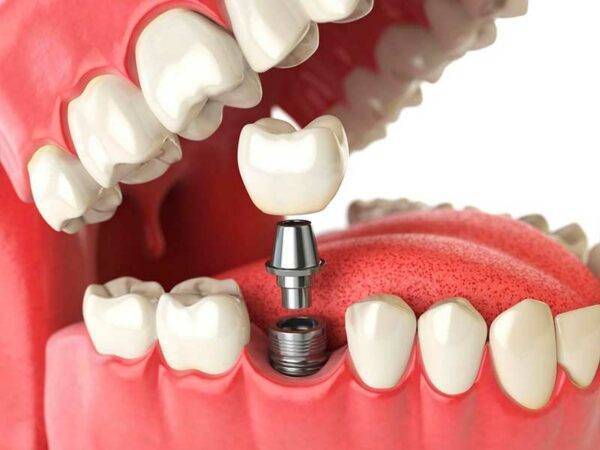
Often temporary and even permanent orthodontic structures are made of plastic. It contains monomers and polymers, as well as coloring substances, which, when interacting with saliva, can provoke allergic symptoms. In this case, a modern safe material is used - acrylic-free plastic. This product is not impregnated with food dyes and has a long service life.
Factors that increase the likelihood of allergies:
- wear and tear of the structure and injury to the mucous membrane, due to which the allergen enters the blood in increased quantities;
- change in saliva acidity;
- disruption of heat exchange between the gum and the prosthesis (most often acrylic), resulting in increased tissue susceptibility;
- existing allergies, especially food allergies and to pollen.
What to do if you are allergic to dentures
An allergic reaction may occur immediately after installation of the prosthesis. Within a few minutes or hours, the first symptoms of a reaction appear.
When they occur, it is necessary to remove the main irritant as quickly as possible.
The removable denture should be removed and you should consult a specialist (dentist, orthodontist, allergist).
If the prosthesis cannot be removed on your own, you need to contact the nearest dental clinic.
An allergic reaction can take months or years to develop. A person feels minor symptoms of its manifestation and does not pay attention to it.
If after installing a new prosthesis a person feels discomfort for a long time, you should immediately contact the specialist who installed it.
It is also necessary to consult with an allergist to find out which of the materials caused the reaction.
Only the symptoms of an allergic reaction can be eliminated. The allergy itself cannot be cured, because it is the effect of an irritating factor (one of the prosthetic materials) on the body, from which the human immune system is protected.
It is impossible to completely get rid of it.
Second generation antihistamines (Semprex, Fenistil, Claritin, Histimet). The medicine blocks allergy symptoms.
Antiallergic - antihistamines (dimelrol, suprastin, tavegil, fenkarol).
Adsorbents (polysorb, activated carbon, diosmectite, smecta, filtrum). They improve overall well-being by removing harmful substances and toxins from the body.
Plasmapheresis procedure. Blood plasma is filtered through special membranes, which allows you to quickly get rid of all allergy symptoms, because “blood renewal” occurs. Used for severe allergic reactions;
Immunosorption procedure. Another option for purifying blood in the body. Used when the body reacts strongly to an allergen.
The use of ointments for the oral cavity (Cholisal, Dentamet, Metrogil Denta, Vokara). This is especially true for concomitant stomatitis.
Dentures should be selected based on the condition and number of your own teeth.
Removable dentures on implants are installed on special fastenings (buttons or a beam). The attachments are implanted into the jaw, so removing them will be quite difficult.
Clasp dentures are an excellent method of partial dentures. The bridge fits onto adjacent teeth, which hold it in the desired position.
Users note the ease of removing such a prosthesis and the low likelihood of allergies . If it is impossible or not desirable to undergo prosthetics with fixed prostheses, clasp bridges will be the solution.
Plastic acrylic dentures are suitable for people with complete absence of teeth. They fit tightly to the jaw, which prevents pieces of food and dirt from penetrating under it.
The plastic is durable, lightweight and does not require careful maintenance.
Nylon dentures are an anti-favorite.
Most users note the expensive cost, which does not correspond to the quality of the material. It is inconvenient to eat, drink, and brush your teeth with them. Another huge disadvantage is the difficulty of getting used to the prosthesis.
Most people who have had nylon prosthetics have never been able to get used to their prosthesis.
I had prosthetics for my entire mouth with metal-ceramics. After a while, I began to notice swelling of my lips in the morning after sleep. First from above, then from below, and so on in a circle. I never had an allergy. Suddenly conjunctivitis appeared. Is it really all from the crowns?
Allergenic components in dentures
Metal (chrome, steel, copper, cobalt, zinc, etc.) crowns have always been considered the most common allergens. The use of non-precious alloys greatly reduces the cost of production of structures. They are actively used for the manufacture of not only crowns (metal and metal-ceramic), but also bridges, and also as a basis for clasp products.
Allergy to metal crowns (symptoms discussed above) is caused by the use in production of cheap alloys and impurities that are not biointeractive components.
Allergy to metal crowns
A completely different picture can be observed if we consider products made from noble metals (gold, silver, platinum). They are not so popular, because the price of precious metals in the modern world is very high and is accessible only to the wealthy. And yet, models and implants made from them rarely cause an allergic reaction and are well accepted by the body with minimal risk of rejection.
The influence of various metals is important when considering such a complication as “galvanic syndrome”. It occurs due to the incompatibility of certain metals in the alloy, which causes a galvanic current that is harmful to the patient. The consequences are sleep disturbance, increased salivation, and intoxication of the body as a whole.
In order for a metal to be used in orthopedics, it must meet the requirements - hardness, aesthetics, lightness and chemical resistance to external factors (saliva, food fibers, pathogenic microflora). The listed factors can provoke oxidation of the metal in the oral cavity, its gradual destruction and corrosion.
Allergy to metal prostheses in dentistry is caused by electrochemical processes that arise due to a conflict between the types of metals, their structure, characteristics of the alloy, temperature conditions of manufacture, the chemical composition of saliva, etc.
Nickel, which is part of the so-called “stainless steel”, is actively used in orthopedics, but saliva causes its corrosion and, as a result, allergies. The alloy with its composition is prohibited from being offered to patients who have had dermatitis in the past or an individual reaction to nickel bracelets, zippers, fasteners and steel jewelry.
Chromium, manganese, and cobalt can also cause various reactions, including allergic stomatitis.
Aluminum silicate or kaolin is often used as a filling composite. This should be taken into account when installing a prosthesis next to a filled tooth, since dissimilar metals may react chemically.
Zirconium crowns are based on zirconium oxide and dioxide, which rarely causes adverse reactions, including allergies.
Zirconium crowns
Ordinary iron, unlike budget alloys, has excellent corrosion resistance, so allergic complications practically do not arise.
But copper in smaller grade gold, solders and fastening materials can react with saliva. The release of metal into saliva, and then gastric juice, blood, and lymph causes general poisoning of the body.
Oxidized zinc is also used in solders, amalgams, and dental cement. In conditions of high humidity, this metal quickly breaks down and dissolves, causing mild toxic reactions.
But the destruction of lead in the process of wearing metal prostheses leads to severe intoxication, an increase in the amount of the substance in the body above permissible limits.
Tin is used in the manufacture of budget crowns from low-melting metals. The component is very toxic, so it is practically not used for medical purposes.
Titanium, molybdenum, and indium in stainless steel practically do not cause allergic reactions.
Silver has a disinfectant and anti-inflammatory effect, so dentures made from this component have a positive effect on the mucous membrane, reducing the risk of infectious processes and diseases.
Silver and gold are resistant to corrosion and rarely cause allergies, which cannot be said about platinum and palladium (strong allergens). Noble metals are non-toxic and do not cause general poisoning of the body.
Let's move on to plastic. Acrylic dentures are considered organic, bioinert and high-polymer models, which, unfortunately, can cause allergic stomatitis and intoxication. The main factor in the development of complications is the residual monomer, which is part of the acrylic composite. Soft plastics and polyurethane rarely cause allergies.
Allergy to plastic prosthesis
Modern silicone and nylon prostheses are considered biologically compatible, protecting the patient as much as possible from side effects.
Ceramics also does not cause allergies.
Sometimes an individual reaction manifests itself to various pigments used in the manufacture of prostheses. Dyes are used to improve the aesthetic characteristics of crowns and acquire the shade chosen by the patient.
Factors that lead to the development of allergies to dentures
- Changing the temperature regime under the installed structure. An increase in temperature will provoke loosening of the soft tissue of the gums and expansion of the capillaries. The monomers released by non-hypoallergenic products will successfully enter the bloodstream.
- Injury to the gums with removable dentures. Through the formed ulcers, it is quite easy for allergenic elements to penetrate into the blood.
- Corrosion processes. Occurs during the oxidation of metal prostheses with saliva.
- Increased acidity of saliva.
- Destruction of a denture due to exceeding its service life.
Symptoms of an allergy to dentures - attention, the allergy condition may worsen!
The symptoms of the pathological condition in question may become apparent several months after the installation of dental structures.
In some cases, the first signs of allergy appear the next day - or 10 years after prosthetics.
- Hyperemia of the mucous membrane. The area of the cheeks, tongue, and soft palate swells.
- Changes in the composition of saliva: it becomes thicker and more viscous. Swallowing it is quite problematic.
- Irritation of the surface of the tongue, which becomes more pronounced when eating salty, spicy foods.
- Frequent injury to the tongue and buccal mucosa while eating. This is due to swelling of the soft tissues.
- Dryness of the oral cavity, the appearance of a metallic or acidic taste. Every meal becomes painful.
- Swelling and burning of soft tissues (mucous membranes of the cheeks, lips, gums, soft palate). These negative conditions become so pronounced that it becomes impossible to use a removable structure.
- The formation of blisters on the face and hands, which, after spontaneous opening, turn into ulcers.
- Swelling of the eyelids, lips, genitals, larynx. These phenomena are accompanied by disturbances in the functioning of the respiratory system (Quincke's edema).
- Runny nose.
- Watery eyes, swelling of the eyelids.
- Gastritis.
Allergic reactions to titanium implants
A very controversial topic in the medical community is an allergic reaction to titanium, because despite the fact that titanium is a completely biologically inert metal, 4% of people who had titanium implants complained of allergic reactions and hypersensitivity at the surgical site.
What is this connected with?
First of all, you need to understand that obtaining absolutely pure titanium is an expensive, labor-intensive and unproductive process, therefore any titanium alloy contains impurities. Their quantity depends on the production technology, the smelting process and the cost of a particular implant.
An allergic reaction that occurs after the installation of implants occurs precisely due to oxidation
or
corrosion of impurity metals
. But still, sometimes even tests can show an allergic reaction to titanium, and although this is a tiny percentage, it is not always possible to attribute it to measurement error or poor-quality sample material.
Diagnosis and treatment of allergies to dentures - what to do if you suspect an allergy?
- Checkup at the dentist. This specialist pays attention to the condition of the oral cavity, crowns, prosthetic bed, and type of saliva. Oxide films on artificial structures indicate the development of allergic reactions.
- Allergy tests to identify specific allergens. They come in several types: cutaneous and provocative. In the first case, skin is punctured using a needle or blade on the forearm, where drops of allergens are subsequently introduced. Provocative tests are carried out exclusively in a hospital setting in cases where other diagnostic methods have proven to be uninformative.
- Elimination + exposure. Relevant for removable structures. The dentist removes the dentures until allergy symptoms disappear. This often takes no more than a week. After the inflammatory phenomena have stopped, the doctor reinstalls the artificial structure and monitors the body’s reaction to it.
- Isolation of the prosthesis from the mucous membrane using gold foil. The specified material is fixed first with a special glue, then with cement. Used for fixed dentures.
- Examination of a venous blood sample for the presence of antibodies that are responsible for the appearance of the pathological condition in question.
Treatment of allergies to dentures begins with eliminating the irritant .
Those who have developed an allergy due to fixed dentures should immediately go to the dentist: this ailment can cause the development of more serious pathologies.
A doctor can solve the problem of intolerance to materials of fixed structures in two ways:
- Their complete elimination and future installation of products to which the patient does not have hypersensitivity. To do this, you need to find out which component of the denture provoked negative phenomena from the body. In addition, a new structure can be installed no earlier than 4 weeks after removing the old one. During this time, all allergy symptoms disappear.
- Screening of the existing prosthesis. To do this, the surface of the product is metalized with hypoallergenic materials. For such purposes, alloys of platinum or gold are often used.
Treatment of allergies to dentures and first aid for the patient
- To eliminate allergy symptoms, antihistamines : Loratadine, Suprastin, Zodak, Claritin, etc. An allergist should select such drugs for each patient.
- If an allergy has caused disruptions in the functioning of the gastrointestinal tract, biliary tract, or nervous system, the patient should receive complex therapy with the participation of appropriate specialists.
- Acute allergic reactions (Quincke's edema) are eliminated through hormone therapy and adrenaline.
- Before the ambulance arrives, you can give the patient an intramuscular injection of Suprastin, Loratadine or another antihistamine that blocks H-1 receptors.
- When the airway is completely closed due to severe swelling of the larynx, doctors perform a cricothyroidotomy .
Therapy methods
Conservative treatment with medications is carried out for acute reactions and complications. At the initial stage, if you contact a specialist in a timely manner, it is enough just to eliminate the source of the allergy - the installed prosthesis.
It should be taken into account that after the procedure, slight hyperemia in the area of the operation may persist for 2 days. It is recommended to limit the load on the implant and observe hygiene rules.
At the initial stage of osseointegration of the structure, patients prone to allergic reactions will need to adhere to dietary nutrition. The following foods should be excluded from the diet: nuts, legumes, citrus fruits, chocolate, tomato, mushrooms, pears.
In severe cases, with severe symptoms and difficulty breathing, the doctor prescribes antihistamines (Suprastin, Tavegil, Diazolin). The course of administration and dosage are determined individually, based on the characteristics of the body and the patient’s condition.
Prevention of the development of allergic reactions to dental implants will include a correct daily routine and diet, compliance with doctor’s recommendations and a healthy immune system.
Prevention of allergies to dentures - how to prevent its occurrence?
The best way to avoid denture rejection is to carefully study the patient’s medical history and conduct allergy skin tests.
The doctor must select materials for prosthetics on an individual basis.
- At first, you should walk with the product constantly until the gums get used to the foreign object. In the future, the prosthesis can be removed during sleep.
- After each meal, the structure should be thoroughly cleaned with toothpaste.
- The amount of solid food in the daily diet should be minimized.
- The denture must be cleaned after each removal and before installation (toothbrush + paste). The structure can only be rinsed in warm water.
Loading.
The pathological condition in question is an acute sensitivity of the tissues that make up the tooth to various irritants. According to statistics, most of the world's population faces a similar problem. Many people do not react in any way to unpleasant sensations, considering it a temporary phenomenon, or an individual... Read more → →
Dental enamel hypoplasia is a congenital disorder of the tooth structure, caused by severe metabolic disorders in the fetus and mother, as well as underdevelopment of hard tissues. In adults, the pathology may be acquired. The disease leads to early loss of teeth and irreversible changes in bite.→
Prevention
The only way to avoid such problems is to undergo an appropriate test to determine the body’s reaction to the components of the denture. To do this, the doctor must collect an anamnesis and find out whether there have been any reactions to metal elements before. A special blood test is also required.
It is important to choose such materials, especially when it comes to implants, that will not cause any negative reaction from the body. When installing a removable denture, it is advisable to adhere to the following recommendations:
- first, they walk with the product constantly until the gums get used to it, and only after that can the dentures be removed at night;
- after each meal, be sure to clean the structure with a toothbrush and toothpaste;
- It is advisable to avoid too hard products so as not to damage the product and cause minor injuries to the mucous membrane.
What to do if the first signs of an allergy to dentures appear?
Allergy to dentures is considered a fairly common and unpleasant occurrence in dentistry. Its symptoms vary from person to person, but you need to know what to do if it happens to someone. The consequences of this process are very serious and life-threatening.
Modern medicine offers a person to restore his smile and teeth in several ways. Some of them are more expensive, others are cheaper, and the procedure for installing artificial elements can differ significantly in each case. But it is important to pay attention to the safety of foreign objects for the body.
Patients are interested in whether there is an allergic reaction to a denture and why this happens. Individual tolerance to different substances and even food products differs among people, as well as its manifestations. In some cases, the allergy is so severe that acute symptoms develop within a few hours. For others, the process will occur gradually, on a cumulative basis, and will make itself felt only after a few months or years.
In any case, you need to understand what exactly leads to such a reaction and try to prevent it. First of all, you should pay attention to the material from which dentures are made:
- nickel is one of the most popular components of stainless steel products, but when in contact with saliva it can cause a severe allergic reaction;
- chromium, cobalt and manganese - with constant contact with the mucous membrane, they provoke the appearance of stomatitis;
- copper is sometimes added to gold alloys to reduce the cost of construction, but it can cause poisoning of the body;
- zinc is gradually destroyed by oxidation and high humidity and, as a result, causes a toxic reaction;
- Lead is completely dangerous for humans, which is why it is rarely used for modern prosthetics.
It is also necessary to pay attention to the fact that some metals are incompatible with each other, and if filling materials contain some elements and prosthetics contain others, this often leads to the occurrence of galvanic current and intoxication of the body. In some cases, an allergy does not appear to the structure itself, but to various small parts - adhesive, hooks, screws, pigments.
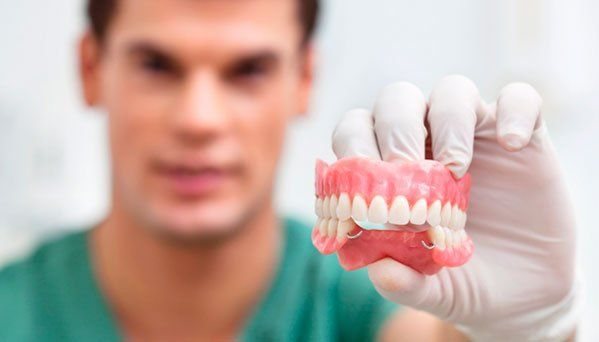
When wearing dentures for a long time, provoking factors that gradually lead to a negative reaction of the body also include:
- Heat exchange processes that occur between the artificial material and the gums if they are not completely adjacent. At higher temperatures, loosening and maceration occurs on the surface of soft tissues, blood vessels dilate and various monomers are absorbed into the blood faster.
- Minor injuries that occur when using removable dentures. When performing normal exercise while eating, constant trauma to the mucous membrane occurs. Such small wounds become a source of inflammation and allergens penetrate into them more easily.
- When metals oxidize, the risk of a negative reaction from the body also increases.
- Sometimes, for some reason, the acidity of saliva changes, due to which haptens are released from the artificial product more quickly. And they, in turn, lead to an allergic reaction.
- If the prosthesis is worn longer than expected, then due to the natural destruction of the material, much more allergens and other harmful components are released into the saliva. The same thing happens if you purchase cheap and low-quality designs. Then the abrasion and destruction of products begins much earlier.
Signs of an allergy to a denture may appear both within the first days after installation and after several years. It all depends on the individual reaction of the body and the cause.
In any case, a person should be alert to the following symptoms:
- redness of soft tissues;
- swelling of the mucous membrane;
- violation of salivation and secretion composition - dry mouth or excessive amount of saliva secreted, its viscosity;
- unpleasant taste;
- runny nose and watery eyes;
- permanent injury to the surfaces of the tongue and cheeks;
- rash, which sometimes spreads to other organs, ulcers on the mucous membrane;
- in more severe cases, body temperature rises;
- with prolonged intoxication, inflammation of the parotid salivary glands occurs, and mumps may begin;
- less often, angioedema occurs, which leads to suffocation.
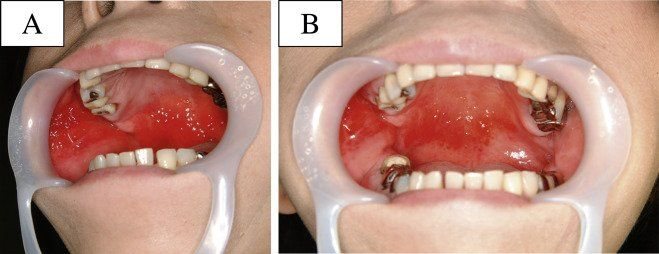
If the doctor did not initially conduct the necessary tests on the body’s reaction to the components of the structure, symptoms are noticed only some time after installation. When the reaction is acute, swelling and redness increase quite quickly. At this time, it is important to remove the product as soon as possible. In the case of removable dentures, you can do this yourself. But if implants have been implanted into the oral cavity, you need to see a dentist to remove the foreign body from the gums.
The specialist is also required to carry out diagnostic procedures:
- Inspection of the condition of the oral cavity and the prosthesis itself. If there is a characteristic film on the structure, it indicates the process of metal oxidation.
- Allergy tests help determine which component in the artificial product the reaction occurred to.
- Sometimes a specialist isolates the material that caused the allergy with gold foil to eliminate unwanted contact of the mucous membrane with certain substances.
- A venous blood test is performed to determine the presence of antibodies.
After removing the structure, you can additionally rinse your mouth with clean water or antiseptic solutions to remove the allergen from the surface of the mucous membrane.
You need to understand that the tendency to allergies itself cannot be treated. All the doctor can do is relieve acute symptoms and select a more suitable material for the denture. The therapy process consists of the following steps:
- taking antihistamines (Suprastin, Claritin, Zodak, Tavegil, Loratidine, etc.);
- for Quincke's edema, a dose of adrenaline and hormone therapy are prescribed;
- in case of general poisoning of the body and intoxication, additional consultation with a gastroenterologist, therapist, and sometimes a neurologist is needed; treatment is carried out symptomatically depending on the reactions that appear; an individual plan for complex therapy is drawn up;
- If the larynx and airways are blocked, cricothyroidotomy must be urgently performed.
Video: allergies to denture materials.
The only way to avoid such problems is to undergo an appropriate test to determine the body’s reaction to the components of the denture. To do this, the doctor must collect an anamnesis and find out whether there have been any reactions to metal elements before. A special blood test is also required.
It is important to choose such materials, especially when it comes to implants, that will not cause any negative reaction from the body. When installing a removable denture, it is advisable to adhere to the following recommendations:
- first, they walk with the product constantly until the gums get used to it, and only after that can the dentures be removed at night;
- after each meal, be sure to clean the structure with a toothbrush and toothpaste;
- It is advisable to avoid too hard products so as not to damage the product and cause minor injuries to the mucous membrane.
Post Views: 155
Symptoms
Signs of an allergy to a denture may appear both within the first days after installation and after several years. It all depends on the individual reaction of the body and the cause.
In any case, a person should be alert to the following symptoms:
- redness of soft tissues;
- swelling of the mucous membrane;
- violation of salivation and secretion composition - dry mouth or excessive amount of saliva secreted, its viscosity;
- unpleasant taste;
- runny nose and watery eyes;
- permanent injury to the surfaces of the tongue and cheeks;
- rash, which sometimes spreads to other organs, ulcers on the mucous membrane;
- in more severe cases, body temperature rises;
- with prolonged intoxication, inflammation of the parotid salivary glands occurs, and mumps may begin;
- less often, angioedema occurs, which leads to suffocation.
If gradual intoxication of the body or its poisoning occurs, disruption of the gastrointestinal tract, bile ducts and even the nervous system may occur. Also, allergies often cause relapse and exacerbation of chronic diseases.










